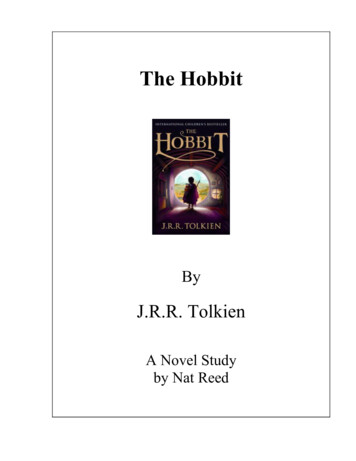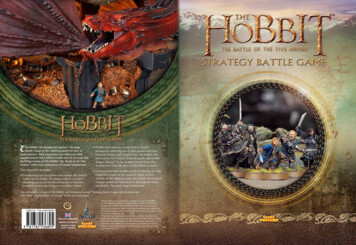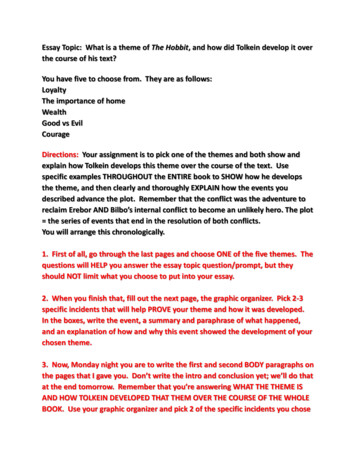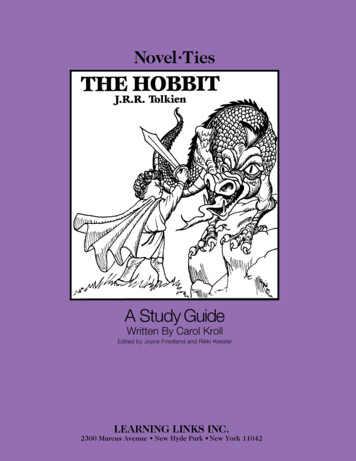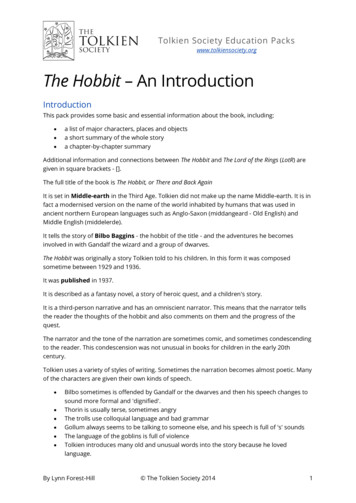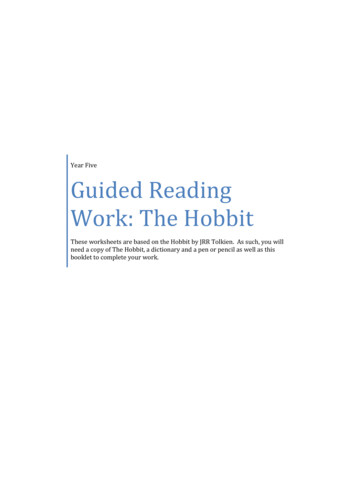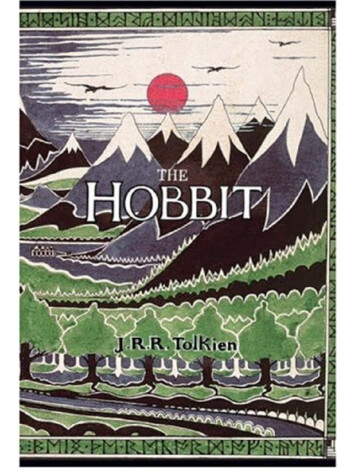
Transcription
THE HOBBIT
ORTHERE AND BACKAGAIN
J.R.R. TOLKIEN
The Hobbit is a tale of high adventure,undertaken by a company of dwarves, in searchof dragon-guarded gold. A reluctant partner inthis perilous quest is Bilbo Baggins, a comfortloving, unambitious hobbit, who surprises evenhimself by his resourcefulness and his skill as aburglar.Encounters with trolls, goblins, dwarves,elves and giant spiders, conversations with thedragon, Smaug the Magnificent, and a ratherunwilling presence at the Battle of the FiveArmies are some of the adventures that befallBilbo. But there are lighter moments as well:good fellowship, welcome meals, laughter andsong.Bilbo Baggins has taken his place amongthe ranks of the immortals of children’s fiction.Written for Professor Tolkien’s own children,The Hobbit met with instant acclaim whenpublished. It is a complete and marvellous talein itself, but it also forms a prelude to The Lordof the Rings.‘One of the most influential books of our
generation’The Times
CONTENTSCOVER PAGETITLE PAGELIST OF ILLUSTRATIONSNOTE ON THE TEXTAUTHOR’S NOTECHAPTER I: AN UNEXPECTED PARTYCHAPTER II: ROAST MUTTONCHAPTER III: A SHORT RESTCHAPTER IV: OVER HILL AND UNDER HILLCHAPTER V: RIDDLES IN THE DARKCHAPTER VI: OUT OF THE FRYING-PANINTO THE FIRE
CHAPTER VII: QUEER LODGINGSCHAPTER VIII: FLIES AND SPIDERSCHAPTER IX: BARRELS OUT OF BONDCHAPTER X: A WARM WELCOMECHAPTER XI: ON THE DOORSTEPCHAPTER XII: INSIDE INFORMATIONCHAPTER XIII: NOT AT HOMECHAPTER XIV: FIRE AND WATERCHAPTER XV: THE GATHERING OF THECLOUDSCHAPTER XVI: A THIEF IN THE NIGHTCHAPTER XVII: THE CLOUDS BURSTCHAPTER XVIII: THE RETURN JOURNEYCHAPTER XIX: THE LAST STAGEWORKS BY J.R.R. TOLKIENCOPYRIGHT
ABOUT THE PUBLISHER
ILLUSTRATIONSThror’s MapThe TrollsThe Mountain-pathThe Misty Mountains looking WestBeorn’s HallThe Elvenking’s GateLake TownThe Front GateThe Hall at Bag-EndMap of Wilderland
NOTE ON THE TEXTThe Hobbit was first published in September1937. Its 1951 second edition (fifth impression)contains a significantly revised portion ofChapter V, “Riddles in the Dark,” which bringsthe story of The Hobbit more in line with itssequel, The Lord of the Rings, then inprogress. Tolkien made some further revisionsto the American edition published by BallantineBooks in February 1966, and to the British thirdedition (sixteenth impression) published byGeorge Allen & Unwin later that same year.For the 1995 British hardcover edition,published by HarperCollins, the text of TheHobbit was entered into word-processing files,and a number of further corrections of misprintsand errors were made. Since then, various
editions of The Hobbit have been generatedfrom that computerized text file. For the presenttext, that file has been compared again, line byline, with the earlier editions, and a number offurther corrections have been made to presenta text that, as closely as possible, representsTolkien’s final intended form.Readers interested in details of thechanges made at various times to the text ofThe Hobbit are referred to Appendix A,“Textual and Revisional Notes,” of TheAnnotated Hobbit (1988), and J. R. R. Tolkien:A Descriptive Bibliography by Wayne G.Hammond, with the assistance of Douglas A.Anderson (1993).Douglas A. AndersonMay 2001
Author's Note
This is a story of long ago. At that time thelanguages and letters were quite different fromours of today. English is used to represent thelanguages. But two points may be noted. (1) InEnglish the only correct plural of dwarf is dwarfs,and the adjective is dwarfish. In this storydwarves and dwarvish are used*, but only whenspeaking of the ancient people to whom ThorinOakenshield and his companions belonged. (2)Orc is not an English word. It occurs in one ortwo places but is usually translated goblin (orhobgoblin for the larger kinds). Orc is thehobbits’ form of the name given at that time tothese creatures, and it is not connected at allwith our orc, ork, applied to sea-animals ofdolphin-kind.Runes were old letters originally used forcutting or scratching on wood, stone, or metal,and so were thin and angular. At the time of this
tale only the Dwarves made regular use ofthem, especially for private or secret records.Their runes are in this book represented byEnglish runes, which are known now to fewpeople. If the runes on Thror’s Map arecompared with the transcriptions into modernletters† †, the alphabet, adapted to modernEnglish, can be discovered and the above runictitle also read. On the Map all the normal runesare found, except for X. I and U are used for Jand V. There was no rune for Q (use CW); norfor Z (the dwarf-runemay be used ifrequired). It will be found, however, that somesingle runes stand for two modern letters: th,ng, ee; other runes of the same kind ( ea andst) were also sometimes used. The secretdoor was marked D . From the side a handpointed to this, and under it was written:The last two runes are the initials of Thror andThrain. The moon-runes read by Elrond were:On the Map the compass points aremarked in runes, with East at the top, as usualin dwarf-maps, and so read clockwise: E(ast),S(outh), W(est), N(orth).
Chapter I
AN UNEXPECTED PARTYIn a hole in the ground there lived a hobbit. Nota nasty, dirty, wet hole, filled with the ends ofworms and an oozy smell, nor yet a dry, bare,sandy hole with nothing in it to sit down on or toeat: it was a hobbit-hole, and that meanscomfort.It had a perfectly round door like a porthole,painted green, with a shiny yellow brass knob inthe exact middle. The door opened on to atube-shaped hall like a tunnel: a verycomfortable tunnel without smoke, with panelledwalls, and floors tiled and carpeted, providedwith polished chairs, and lots and lots of pegsfor hats and coats—the hobbit was fond ofvisitors. The tunnel wound on and on, goingfairly but not quite straight into the side of the hill—The Hill, as all the people for many milesround called it—and many little round doorsopened out of it, first on one side and then onanother. No going upstairs for the hobbit:bedrooms, bathrooms, cellars, pantries (lots ofthese), wardrobes (he had whole rooms
devoted to clothes), kitchens, dining-rooms, allwere on the same floor, and indeed on thesame passage. The best rooms were all on theleft-hand side (going in), for these were the onlyones to have windows, deep-set roundwindows looking over his garden, andmeadows beyond, sloping down to the river.This hobbit was a very well-to-do hobbit,and his name was Baggins. The Bagginseshad lived in the neighbourhood of The Hill fortime out of mind, and people considered themvery respectable, not only because most ofthem were rich, but also because they neverhad any adventures or did anything unexpected:you could tell what a Baggins would say on anyquestion without the bother of asking him. Thisis a story of how a Baggins had an adventure,and found himself doing and saying thingsaltogether unexpected. He may have lost theneighbours’ respect, but he gained—well, youwill see whether he gained anything in the end.The mother of our particular hobbit—what isa hobbit? I suppose hobbits need somedescription nowadays, since they have becomerare and shy of the Big People, as they call us.They are (or were) a little people, about half ourheight, and smaller than the bearded Dwarves.Hobbits have no beards. There is little or nomagic about them, except the ordinary
everyday sort which helps them to disappearquietly and quickly when large stupid folk likeyou and me come blundering along, making anoise like elephants which they can hear a mileoff. They are inclined to be fat in the stomach;they dress in bright colours (chiefly green andyellow); wear no shoes, because their feet grownatural leathery soles and thick warm brownhair like the stuff on their heads (which is curly);have long clever brown fingers, good-naturedfaces, and laugh deep fruity laughs (especiallyafter dinner, which they have twice a day whenthey can get it). Now you know enough to go onwith. As I was saying, the mother of this hobbit—of Bilbo Baggins, that is—was the famousBelladonna Took, one of the three remarkabledaughters of the Old Took, head of the hobbitswho lived across The Water, the small river thatran at the foot of The Hill. It was often said (inother families) that long ago one of the Tookancestors must have taken a fairy wife. Thatwas, of course, absurd, but certainly there wasstill something not entirely hobbitlike aboutthem, and once in a while members of theTook-clan would go and have adventures. Theydiscreetly disappeared, and the family hushed itup; but the fact remained that the Tooks werenot as respectable as the Bagginses, thoughthey were undoubtedly richer.
Not that Belladonna Took ever had anyadventures after she became Mrs. BungoBaggins. Bungo, that was Bilbo’s father, builtthe most luxurious hobbit-hole for her (and partlywith her money) that was to be found eitherunder The Hill or over The Hill or across TheWater, and there they remained to the end oftheir days. Still it is probable that Bilbo, her onlyson, although he looked and behaved exactlylike a second edition of his solid andcomfortable father, got something a bit queer inhis make-up from the Took side, something thatonly waited for a chance to come out. Thechance never arrived, until Bilbo Baggins wasgrown up, being about fifty years old or so, andliving in the beautiful hobbit-hole built by hisfather, which I have just described for you, untilhe had in fact apparently settled downimmovably.By some curious chance one morning longago in the quiet of the world, when there wasless noise and more green, and the hobbitswere still numerous and prosperous, and BilboBaggins was standing at his door afterbreakfast smoking an enormous long woodenpipe that reached nearly down to his woolly toes(neatly brushed)—Gandalf came by. Gandalf! Ifyou had heard only a quarter of what I haveheard about him, and I have only heard very little
of all there is to hear, you would be prepared forany sort of remarkable tale. Tales andadventures sprouted up all over the placewherever he went, in the most extraordinaryfashion. He had not been down that way underThe Hill for ages and ages, not since his friendthe Old Took died, in fact, and the hobbits hadalmost forgotten what he looked like. He hadbeen away over The Hill and across The Wateron businesses of his own since they were allsmall hobbit-boys and hobbit-girls.All that the unsuspecting Bilbo saw thatmorning was an old man with a staff. He had atall pointed blue hat, a long grey cloak, a silverscarf over which his long white beard hungdown below his waist, and immense blackboots.“Good Morning!” said Bilbo, and he meantit. The sun was shining, and the grass was verygreen. But Gandalf looked at him from underlong bushy eyebrows that stuck out further thanthe brim of his shady hat.“What do you mean?” he said. “Do you wishme a good morning, or mean that it is a goodmorning whether I want it or not; or that you feelgood this morning; or that it is a morning to begood on?”“All of them at once,” said Bilbo. “And a veryfine morning for a pipe of tobacco out of doors,
into the bargain. If you have a pipe about you,sit down and have a fill of mine! There’s nohurry, we have all the day before us!” Then Bilbosat down on a seat by his door, crossed hislegs, and blew out a beautiful grey ring ofsmoke that sailed up into the air withoutbreaking and floated away over The Hill.“Very pretty!” said Gandalf. “But I have notime to blow smoke-rings this morning. I amlooking for someone to share in an adventurethat I am arranging, and it’s very difficult to findanyone.”“I should think so—in these parts! We areplain quiet folk and have no use for adventures.Nasty disturbing uncomfortable things! Makeyou late for dinner! I can’t think what anybodysees in them,” said our Mr. Baggins, and stuckone thumb behind his braces, and blew outanother even bigger smoke-ring. Then he tookout his morning letters, and began to read,pretending to take no more notice of the oldman. He had decided that he was not quite hissort, and wanted him to go away. But the oldman did not move. He stood leaning on hisstick and gazing at the hobbit without sayinganything, till Bilbo got quite uncomfortable andeven a little cross.“Good morning!” he said at last. “We don’twant any adventures here, thank you! You might
try over The Hill or across The Water.” By thishe meant that the conversation was at an end.“What a lot of things you do use Goodmorning for!” said Gandalf. “Now you mean thatyou want to get rid of me, and that it won’t begood till I move off.”“Not at all, not at all, my dear sir! Let mesee, I don’t think I know your name?”“Yes, yes, my dear sir—and I do know yourname, Mr. Bilbo Baggins. And you do know myname, though you don’t remember that I belongto it. I am Gandalf, and Gandalf means me! Tothink that I should have lived to be goodmorninged by Belladonna Took’s son, as if Iwas selling buttons at the door!”“Gandalf, Gandalf! Good gracious me! Notthe wandering wizard that gave Old Took a pairof magic diamond studs that fastenedthemselves and never came undone tillordered? Not the fellow who used to tell suchwonderful tales at parties, about dragons andgoblins and giants and the rescue ofprincesses and the unexpected luck of widows’sons? Not the man that used to make suchparticularly excellent fireworks! I rememberthose! Old Took used to have them onMidsummer’s Eve. Splendid! They used to goup like great lilies and snapdragons andlaburnums of fire and hang in the twilight all
evening!” You will notice already that Mr.Baggins was not quite so prosy as he liked tobelieve, also that he was very fond of flowers.“Dear me!” he went on. “Not the Gandalf whowas responsible for so many quiet lads andlasses going off into the Blue for madadventures? Anything from climbing trees tovisiting elves—or sailing in ships, sailing toother shores! Bless me, life used to be quiteinter—I mean, you used to upset things badly inthese parts once upon a time. I beg yourpardon, but I had no idea you were still inbusiness.”“Where else should I be?” said the wizard.“All the same I am pleased to find youremember something about me. You seem toremember my fireworks kindly, at any rate, andthat is not without hope. Indeed for your oldgrandfather Took’s sake, and for the sake ofpoor Belladonna, I will give you what you askedfor.”“I beg your pardon, I haven’t asked foranything!”“Yes, you have! Twice now. My pardon. Igive it you. In fact I will go so far as to send youon this adventure. Very amusing for me, verygood for you—and profitable too, very likely, ifyou ever get over it.”“Sorry! I don’t want any adventures, thank
you. Not today. Good morning! But pleasecome to tea—any time you like! Why nottomorrow? Come tomorrow! Good bye!” Withthat the hobbit turned and scuttled inside hisround green door, and shut it as quickly as hedared, not to seem rude. Wizards after all arewizards.“What on earth did I ask him to tea for!” hesaid to himself, as he went to the pantry. He hadonly just had breakfast, but he thought a cake ortwo and a drink of something would do himgood after his fright.Gandalf in the meantime was still standingoutside the door, and laughing long but quietly.After a while he stepped up, and with the spikeon his staff scratched a queer sign on thehobbit’s beautiful green front-door. Then hestrode away, just about the time when Bilbowas finishing his second cake and beginning tothink that he had escaped adventures very well.The next day he had almost forgotten aboutGandalf. He did not remember things very well,unless he put them down on his EngagementTablet: like this: Gandalf Tea Wednesday .Yesterday he had been too flustered to doanything of the kind.Just before tea-time there came atremendous ring on the front-door bell, and thenhe remembered! He rushed and put on the
kettle, and put out another cup and saucer, andan extra cake or two, and ran to the door.“I am so sorry to keep you waiting!” he wasgoing to say, when he saw that it was notGandalf at all. It was a dwarf with a blue beardtucked into a golden belt, and very bright eyesunder his dark-green hood. As soon as thedoor was opened, he pushed inside, just as ifhe had been expected.He hung his hooded cloak on the nearestpeg, and “Dwalin at your service!” he said witha low bow.“Bilbo Baggins at yours!” said the hobbit,too surprised to ask any questions for themoment. When the silence that followed hadbecome uncomfortable, he added: “I am justabout to take tea; pray come and have somewith me.” A little stiff perhaps, but he meant itkindly. And what would you do, if an uninviteddwarf came and hung his things up in your hallwithout a word of explanation?They had not been at table long, in fact theyhad hardly reached the third cake, when therecame another even louder ring at the bell.“Excuse me!” said the hobbit, and off hewent to the door.“So you have got here at last!” That waswhat he was going to say to Gandalf this time.But it was not Gandalf. Instead there was a very
old-looking dwarf on the step with a white beardand a scarlet hood; and he too hopped insideas soon as the door was open, just as if he hadbeen invited.“I see they have begun to arrive already,” hesaid when he caught sight of Dwalin’s greenhood hanging up. He hung his red one next to it,and “Balin at your service!” he said with hishand on his breast.“Thank you!” said Bilbo with a gasp. It wasnot the correct thing to say, but they havebegun to arrive had flustered him badly. Heliked visitors, but he liked to know them beforethey arrived, and he preferred to ask themhimself. He had a horrible thought that thecakes might run short, and then he—as thehost: he knew his duty and stuck to it howeverpainful—he might have to go without.“Come along in, and have some tea!” hemanaged to say after taking a deep breath.“A little beer would suit me better, if it is allthe same to you, my good sir,” said Balin withthe white beard. “But I don’t mind some cake—seed-cake, if you have any.”“Lots!” Bilbo found himself answering, to hisown surprise; and he found himself scuttling off,too, to the cellar to fill a pint beer-mug, and thento a pantry to fetch two beautiful round seed-
cakes which he had baked that afternoon for hisafter-supper morsel.When he got back Balin and Dwalin weretalking at the table like old friends (as a matterof fact they were brothers). Bilbo plumped downthe beer and the cake in front of them, whenloud came a ring at the bell again, and thenanother ring.“Gandalf for certain this time,” he thought ashe puffed along the passage. But it was not. Itwas two more dwarves, both with blue hoods,silver belts, and yellow beards; and each ofthem carried a bag of tools and a spade. In theyhopped, as soon as the door began to open—Bilbo was hardly surprised at all.“What can I do for you, my dwarves?” hesaid.“Kili at your service!” said the one. “AndFili!” added the other; and they both swept offtheir blue hoods and bowed.“At yours and your family’s!” replied Bilbo,remembering his manners this time.“Dwalin and Balin here already, I see,” saidKili. “Let us join the throng!”“Throng!” thought Mr. Baggins. “I don’t likethe sound of that. I really must sit down for aminute and collect my wits, and have a drink.”He had only just had a sip—in the corner, whilethe four dwarves sat round the table, and talked
about mines and gold and troubles with thegoblins, and the depredations of dragons, andlots of other things which he did not understand,and did not want to, for they sounded much tooadventurous—when, ding-dong-a-ling-dang,his bell rang again, as if some naughty littlehobbit-boy was trying to pull the handle off.“Someone at the door!” he said, blinking.“Some four, I should say by the sound,” saidFili. “Besides, we saw them coming alongbehind us in the distance.”The poor little hobbit sat down in the halland put his head in his hands, and wonderedwhat had happened, and what was going tohappen, and whether they would all stay tosupper. Then the bell rang again louder thanever, and he had to run to the door. It was notfour after all, it was five. Another dwarf hadcome along while he was wondering in the hall.He had hardly turned the knob, before they wereall inside, bowing and saying “at your service”one after another. Dori, Nori, Ori, Oin, and Gloinwere their names; and very soon two purplehoods, a grey hood, a brown hood, and a whitehood were hanging on the pegs, and off theymarched with their broad hands stuck in theirgold and silver belts to join the others. Already ithad almost become a throng. Some called forale, and some for porter, and one for coffee,
and all of them for cakes; so the hobbit waskept very busy for a while.A big jug of coffee had just been set in thehearth, the seed-cakes were gone, and thedwarves were starting on a round of butteredscones, when there came—a loud knock. Not aring, but a hard rat-tat on the hobbit’s beautifulgreen door. Somebody was banging with astick!Bilbo rushed along the passage, very angry,and altogether bewildered and bewuthered—this was the most awkward Wednesday he everremembered. He pulled open the door with ajerk, and they all fell in, one on top of the other.More dwarves, four more! And there wasGandalf behind, leaning on his staff andlaughing. He had made quite a dent on thebeautiful door; he had also, by the way,knocked out the secret mark that he had putthere the morning before.“Carefully! Carefully!” he said. “It is not likeyou, Bilbo, to keep friends waiting on the mat,and then open the door like a pop-gun! Let meintroduce Bifur, Bofur, Bombur, and especiallyThorin!”“At your service!” said Bifur, Bofur, andBombur standing in a row. Then they hung uptwo yellow hoods and a pale green one; andalso a sky-blue one with a long silver tassel.
This last belonged to Thorin, an enormouslyimportant dwarf, in fact no other than the greatThorin Oakenshield himself, who was not at allpleased at falling flat on Bilbo’s mat with Bifur,Bofur, and Bombur on top of him. For one thingBombur was immensely fat and heavy. Thorinindeed was very haughty, and said nothingabout service; but poor Mr. Baggins said hewas sorry so many times, that at last he grunted“pray don’t mention it,” and stopped frowning.“Now we are all here!” said Gandalf, lookingat the row of thirteen hoods—the bestdetachable party hoods—and his own hathanging on the pegs. “Quite a merry gathering! Ihope there is something left for the late-comersto eat and drink! What’s that? Tea! No thankyou! A little red wine, I think for me.”“And for me,” said Thorin.“And raspberry jam and apple-tart,” saidBifur.“And mince-pies and cheese,” said Bofur.“And pork-pie and salad,” said Bombur.“And more cakes—and ale—and coffee, ifyou don’t mind,” called the other dwarvesthrough the door.“Put on a few eggs, there’s a good fellow!”Gandalf called after him, as the hobbit stumpedoff to the pantries. “And just bring out the coldchicken and pickles!”
“Seems to know as much about the insideof my larders as I do myself!” thought Mr.Baggins, who was feeling positively flummoxed,and was beginning to wonder whether a mostwretched adventure had not come right into hishouse. By the time he had got all the bottles anddishes and knives and forks and glasses andplates and spoons and things piled up on bigtrays, he was getting very hot, and red in theface, and annoyed.“Confusticateandbebotherthesedwarves!” he said aloud. “Why don’t they comeand lend a hand?” Lo and behold! there stoodBalin and Dwalin at the door of the kitchen, andFili and Kili behind them, and before he coulds a y knife they had whisked the trays and acouple of small tables into the parlour and setout everything afresh.Gandalf sat at the head of the party with thethirteen dwarves all round: and Bilbo sat on astool at the fireside, nibbling at a biscuit (hisappetite was quite taken away), and trying tolook as if this was all perfectly ordinary and notin the least an adventure. The dwarves ate andate, and talked and talked, and time got on. Atlast they pushed their chairs back, and Bilbomade a move to collect the plates and glasses.“I suppose you will all stay to supper?” hesaid in his politest unpressing tones.
“Of course!” said Thorin. “And after. Weshan’t get through the business till late, and wemust have some music first. Now to clear up!”Thereupon the twelve dwarves—not Thorin,he was too important, and stayed talking toGandalf—jumped to their feet, and made tallpiles of all the things. Off they went, not waitingfor trays, balancing columns of plates, each witha bottle on the top, with one hand, while thehobbit ran after them almost squeaking withfright: “please be careful!” and “please, don’ttrouble! I can manage.” But the dwarves onlystarted to sing:Chip the glasses and crack the plates!Blunt the knives and bend the forks!That’s what Bilbo Baggins hates–Smash the bottles and burn the corks!Cut the cloth and tread on the fat!Pour the milk on the pantry floor!Leave the bones on the bedroom mat!Splash the wine on every door!
Dump the crocks in a boiling bowl;Pound them up with a thumping pole;And when you’ve finished, if any arewhole,Send them down the hall to roll!That’s what Bilbo Baggins hates!So, carefully! carefully with the plates!And of course they did none of thesedreadful things, and everything was cleanedand put away safe as quick as lightning, whilethe hobbit was turning round and round in themiddle of the kitchen trying to see what theywere doing. Then they went back, and foundThorin with his feet on the fender smoking apipe. He was blowing the most enormoussmoke-rings, and wherever he told one to go, itwent—up the chimney, or behind the clock onthe mantelpiece, or under the table, or roundand round the ceiling; but wherever it went itwas not quick enough to escape Gandalf. Pop!he sent a smaller smoke-ring from his shortclay-pipe straight through each one of Thorin’s.
Then Gandalf’s smoke-ring would go green andcome back to hover over the wizard’s head. Hehad a cloud of them about him already, and inthe dim light it made him look strange andsorcerous. Bilbo stood still and watched—heloved smoke-rings—and then he blushed tothink how proud he had been yesterdaymorning of the smoke-rings he had sent up thewind over The Hill.“Now for some music!” said Thorin. “Bringout the instruments!”Kili and Fili rushed for their bags andbrought back little fiddles; Dori, Nori, and Oribrought out flutes from somewhere inside theircoats; Bombur produced a drum from the hall;Bifur and Bofur went out too, and came backwith clarinets that they had left among thewalking-sticks. Dwalin and Balin said: “Excuseme, I left mine in the porch!” “Just bring mine inwith you!” said Thorin. They came back withviols as big as themselves, and with Thorin’sharp wrapped in a green cloth. It was a beautifulgolden harp, and when Thorin struck it themusic began all at once, so sudden and sweetthat Bilbo forgot everything else, and was sweptaway into dark lands under strange moons, farover The Water and very far from his hobbithole under The Hill.The dark came into the room from the little
window that opened in the side of The Hill; thefirelight flickered—it was April—and still theyplayed on, while the shadow of Gandalf’s beardwagged against the wall.The dark filled all the room, and the fire dieddown, and the shadows were lost, and still theyplayed on. And suddenly first one and thenanother began to sing as they played, deepthroated singing of the dwarves in the deepplaces of their ancient homes; and this is like afragment of their song, if it can be like theirsong without their music.Far over the misty mountains coldTo dungeons deep and caverns oldWe must away ere break of dayTo seek the pale enchanted gold.The dwarves of yore made mighty spells,While hammers fell like ringing bellsIn places deep, where dark things sleep,In hollow halls beneath the fells.
For ancient king and elvish lordThere many a gleaming golden hoardThey shaped and wrought, and light theycaughtTo hide in gems on hilt of sword.On silver necklaces they strungThe flowering stars, on crowns they hungThe dragon-fire, in twisted wireThey meshed the light of moon and sun.Far over the misty mountains coldTo dungeons deep and caverns oldWe must away, ere break of day,To claim our long-forgotten gold.Goblets they carved there for themselvesAnd harps of gold; where no man delvesThere lay they long, and many a songWas sung unheard by men or elves.The pines were roaring on the height,
The winds were moaning in the night.The fire was red, it flaming spread;The trees like torches blazed with light.The bells were ringing in the daleAnd men looked up with faces pale;The dragon’s ire more fierce than fireLaid low their towers and houses frail.The mountain smoked beneath themoon;The dwarves, they heard the tramp ofdoom.They fled their hall to dying fallBeneath his feet, beneath the moon.Far over the misty mountains grimTo dungeons deep and caverns dimWe must away, ere break of day,To win our harps and gold from him!
As they sang the hobbit felt the love ofbeautiful things made by hands and by cunningand by magic moving through him, a fierce anda jealous love, the desire of the hearts ofdwarves. Then something Tookish woke upinside him, and he wished to go and see thegreat mountains, and hear the pine-trees andthe waterfalls, and explore the caves, and weara sword instead of a walking-stick. He lookedout of the window. The stars were out in a darksky above the trees. He thought of the jewels ofthe dwarves shining in dark caverns. Suddenlyin the wood beyond The Water a flame leapt up—probably somebody lighting a wood-fire—and he thought of plundering dragons settlingon his quiet Hill and kindling it all to flames. Heshuddered; and very quickly he was plain Mr.Baggins of Bag-End, Under-Hill, again.He got up trembling. H
The Hobbit was first published in September 1937. Its 1951 second edition (fifth impression) contains a significantly revised portion of Chapter V, "Riddles in the Dark," which brings the story of The Hobbit more in line with its sequel, The Lord of the Rings, then in progress. Tolkien made some further revisions


